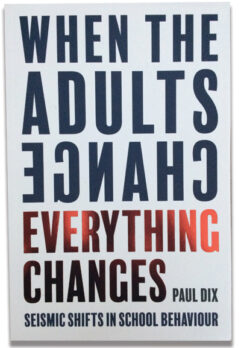Relationships matter. People matter. As educators, we are not dealing with faceless statistics, we are dealing with brilliant, funny, smart, infuriating, imperfect human beings. Hundreds of them, every day. People respond best to people, not to rules, and our pupils are no exception.
We take it for granted that we all do what we do because we genuinely care about improving the lives of the young people in our schools. However, how often do we say it – to ourselves, or to others? How often do we show it? This book reminded me that we should all say it, loudly and regularly.
I found myself nodding so much in agreement at Paul Dix’s notion of “deliberate botheredness” that I almost gave myself whiplash. It is not enough for you to know that you care; you have to show it. Even when faced by silence, blank faces, or eye-rolls, we need to go out of our way to show our young people that we care about them and their success and wellbeing.
I found myself nodding so much in agreement that I almost gave myself whiplash
I challenge everybody to take the “policy language: education or incarceration” quiz in this book and not be shocked at how much prison terminology litters the language of education. It is hardly surprising that relationships can be fraught, when they are often formed using the language of prisoner and warden.
I pride myself on being somebody with a decent level of emotional intelligence, but this book made me cringe thinking of some of my own behaviours and patterns. It forced me to reflect on things that I do and things that I don’t do. In the short time since reading this book, it has already made me a better principal, and in the process, a better human.
When leading a school in difficult circumstances, Ofsted and the local community, quite rightly, want tangible improvements, and quickly, especially when it comes to behaviour. As a result, the focus is often on policies and tactics, not people and relationships. These policies and tactics can have real impact in the short term, but it is vital that they are created, monitored and enforced, remembering the people we are here to serve.
I credit the transformation Thistley Hough with our drive to re-establish the ethos and culture of the school. We needed to take the time to remember why we do what we do. Building strong relationships amongst staff and with pupils and parents allowed us to ensure that teachers could teach and learners could learn. We are now the most improved school in Stoke-on-Trent, in the top 25 per cent of the country for progress, and have gone from special measures to ‘good’ with ‘outstanding’ features.
It was not easy and I wish that we had had this book to accompany on our journey. It provides a useful common-sense framework for leaders. I will certainly be using this to help me to be more ambitious in what we can achieve, as we continue our journey to outstanding.
However, this book is not just for senior leaders. Regardless of where you are in your career, it is an important read. It provides newly qualified teachers a tangible way to shape their practice – “keystone tips”, “flipping the script”, and “30-second interventions”, while also being a great reminder to more seasoned practitioners of the fundamentals of human interaction. Every chapter ends with three takeaways: testing, nuggets, and things to watch out for, making it easy to pick up and put down as necessary.
Education is a serious business, but serious does not have to mean boring. This book is warm, full of humour and its anecdotes make it easily relatable to all of us. I genuinely laughed aloud throughout.
As I read When the adults change, everything changes, I was constantly reminded of the Rita Pierson quote, “every child deserves a champion – an adult who will never give up on them”. This book will help you to be that champion.













When adults change everything changes is a must read for anyone working with children. It is one of the main factors of my career choice and helped me solidify my thoughts on wanting to be a teacher. It’s little insights on what children are thinking are amazingly accurate and from a students perspective I can agree with what paul thinks children appreciate and what they need. What he says in the book about behaviour, relationships and just minor changes that need to be made in the behaviour system, is extremely insightful. I’m not just a teacher telling you it might work if you put his practice into place I’m saying as a student if a teacher acted or had pivotal values then minor and major behaviour issues in the classroom would drop dramatically and you will be able to build a much stronger relationship with your students. This isn’t just “other book about how to manage behaviour” it’s a unique insight on the thoughts and feelings of students and how to work with them. A definite must read!